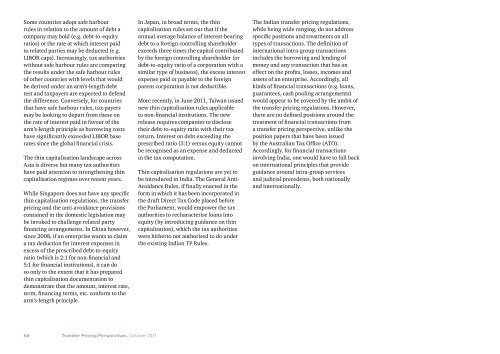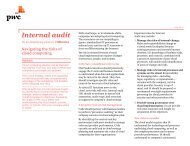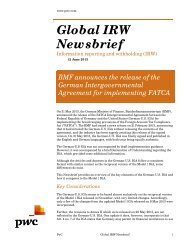Transfer pricing perspectives: Winds of Change - PwC
Transfer pricing perspectives: Winds of Change - PwC
Transfer pricing perspectives: Winds of Change - PwC
You also want an ePaper? Increase the reach of your titles
YUMPU automatically turns print PDFs into web optimized ePapers that Google loves.
Some countries adopt safe harbourrules in relation to the amount <strong>of</strong> debt acompany may hold (e.g. debt-to-equityratios) or the rate at which interest paidto related parties may be deducted (e.g.LIBOR caps). Increasingly, tax authoritieswithout safe harbour rules are comparingthe results under the safe harbour rules<strong>of</strong> other countries with levels that wouldbe derived under an arm’s-length debttest and taxpayers are expected to defendthe difference. Conversely, for countriesthat have safe harbour rules, tax-payersmay be looking to depart from these onthe rate <strong>of</strong> interest paid in favour <strong>of</strong> thearm’s‐length principle as borrowing costshave significantly exceeded LIBOR baserates since the global financial crisis.The thin capitalisation landscape acrossAsia is diverse but many tax authoritieshave paid attention to strengthening thincapitalisation regimes over recent years.While Singapore does not have any specificthin capitalisation regulations, the transfer<strong>pricing</strong> and the anti‐avoidance provisionscontained in the domestic legislation maybe invoked to challenge related partyfinancing arrangements. In China however,since 2008, if an enterprise wants to claima tax deduction for interest expenses inexcess <strong>of</strong> the prescribed debt-to-equityratio (which is 2:1 for non‐financial and5:1 for financial institutions), it can doso only to the extent that it has preparedthin capitalisation documentation todemonstrate that the amount, interest rate,term, financing terms, etc. conform to thearm’s-length principle.In Japan, in broad terms, the thincapitalisation rules set out that if theannual average balance <strong>of</strong> interest‐bearingdebt to a foreign controlling shareholderexceeds three times the capital contributedby the foreign controlling shareholder (ordebt‐to‐equity ratio <strong>of</strong> a corporation with asimilar type <strong>of</strong> business), the excess interestexpense paid or payable to the foreignparent corporation is not deductible.More recently, in June 2011, Taiwan issuednew thin capitalisation rules applicableto non‐financial institutions. The newrelease requires companies to disclosetheir debt‐to‐equity ratio with their taxreturn. Interest on debt exceeding theprescribed ratio (3:1) versus equity cannotbe recognised as an expense and deductedin the tax computation.Thin capitalisation regulations are yet tobe introduced in India. The General Anti-Avoidance Rules, if finally enacted in theform in which it has been incorporated inthe draft Direct Tax Code placed beforethe Parliament, would empower the taxauthorities to recharacterise loans intoequity (by introducing guidance on thincapitalisation), which the tax authoritieswere hitherto not authorised to do underthe existing Indian TP Rules.The Indian transfer <strong>pricing</strong> regulations,while being wide ranging, do not addressspecific positions and treatments on alltypes <strong>of</strong> transactions. The definition <strong>of</strong>international intra-group transactionsincludes the borrowing and lending <strong>of</strong>money and any transaction that has aneffect on the pr<strong>of</strong>its, losses, incomes andassets <strong>of</strong> an enterprise. Accordingly, allkinds <strong>of</strong> financial transactions (e.g. loans,guarantees, cash pooling arrangements)would appear to be covered by the ambit <strong>of</strong>the transfer <strong>pricing</strong> regulations. However,there are no defined positions around thetreatment <strong>of</strong> financial transactions froma transfer <strong>pricing</strong> perspective, unlike theposition papers that have been issuedby the Australian Tax Office (ATO).Accordingly, for financial transactionsinvolving India, one would have to fall backon international principles that provideguidance around intra‐group servicesand judicial precedents, both nationallyand internationally.66 <strong>Transfer</strong> Pricing Perspectives. October 2011
















